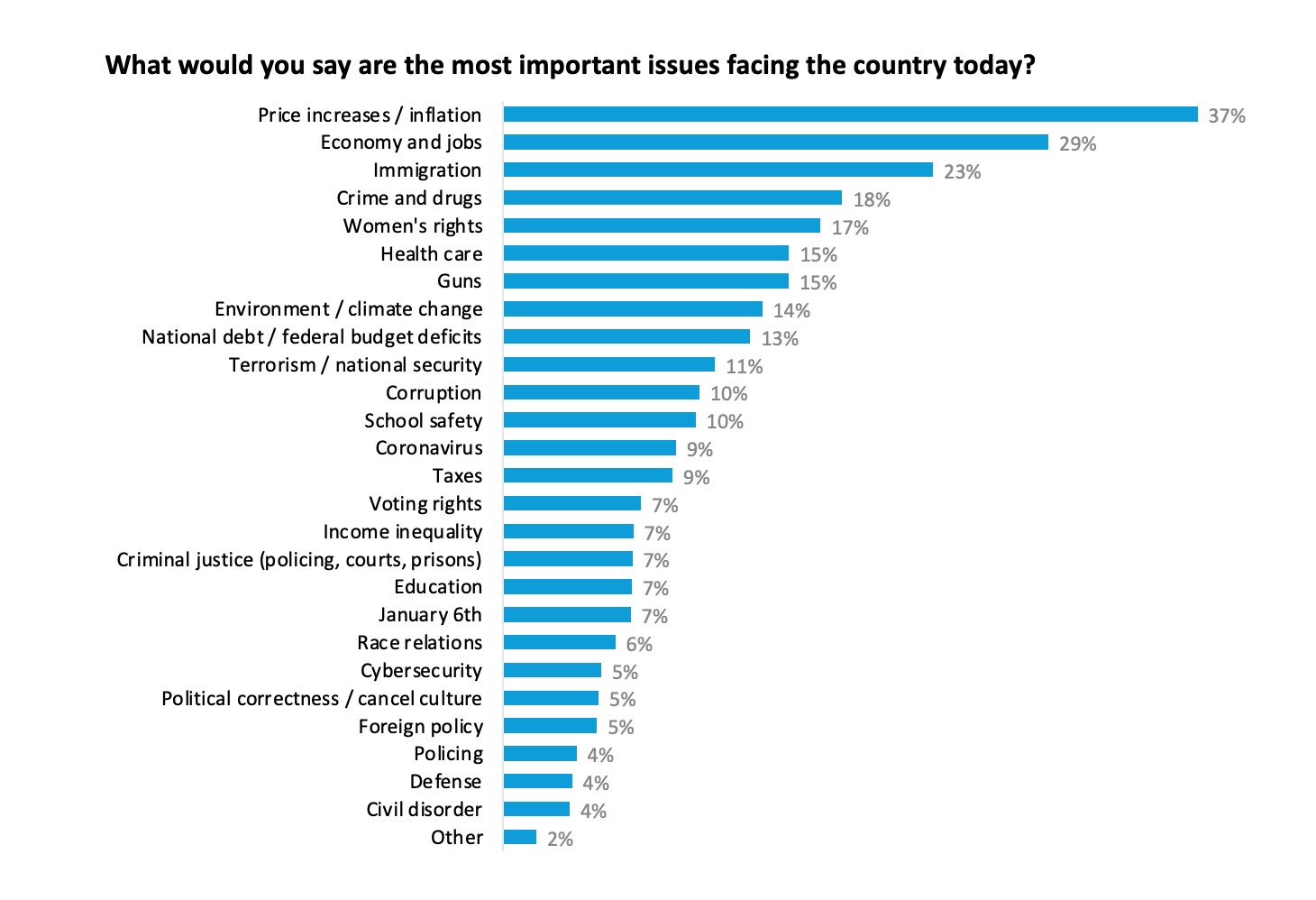Data
WHAT THE DATA SAY: Americans voting on economy in November balloting
By: Ray Day
CONTACT:
We wanted to share our latest consumer and business insights, based on research from The Harris Poll, a Stagwell agency.
Among the highlights of wave 138 (fielded Oct. 14-Oct. 16) in our weekly consumer sentiment tracking:

ECONOMY, INFLATION WORRIES UP AGAIN:
Today, 89% of Americans are concerned about the economy, inflation and jobs – up 3 points from last week.
-
- 85% worry about a potential U.S. recession (up 3 points)
- 83% about U.S. crime rates (up 2 points)
- 74% about political divisiveness (up 1 point)
- 74% about the War on Ukraine (up 1 point)
- 73% about affording their living expenses (no change)
- 60% about a new COVID-19 variant (up 3 points)
- 48% about the Monkeypox outbreak (up 1 point)
- 47% about losing their jobs (down 1 point)
VOTERS SEE ECONOMY ON NOVEMBER BALLOT:
Mid-term elections are less than three weeks away, and inflation and the economy might be casting the deciding votes, according to our latest survey with Harvard’s Center for American Political Studies.
-
- When asked to pick the most important issues facing the country today, voters identified inflation (37%), the economy and jobs (29%), immigration (23%) and crime (18%).
- 73% believe inflation is increasing (versus 12% who say it is moderating and 14% who say it is staying the same).
- 65% think the U.S. economy today is weak (versus 35% who say strong), and 57% say their financial situation is worse (up 20 points from a year ago).
- 84% think the U.S. is in a recession now or will be in the next year.
- 65% oppose easing sanctions on countries like Iran and Venezuela to lower gas and oil prices. Instead, they want greater output of American oil and gas.
- 54% think the U.S. should cut military sales and technical aid to the Saudi Arabian government in response to its oil production cut.
NO KIDS = FREEDOM, MILLENNIALS SAY:
Americans are having fewer children than are needed to keep population numbers stable. Yet why are people choosing not to have children? In our survey:
-
- Of those without children, 52% do not want to have a child in the future, while 20% remain unsure.
- For those who have decided against having children, 54% want to maintain their personal independence/finances, 40% want work-life balance, 33% say it’s due to housing prices, 31% cite the current political situation, 31% say it’s because of safety concerns, and 28% cite climate change.
- 55% of men and 53% of women reported that their desire to maintain independence influences their decision not to have children.
- 65% agree that the freedom that comes with not having kids brings them happiness – increasing to 73% among Millennials, according to a similar survey with Fortune.
CREDIT SCORES IMMUNE FROM PANDEMIC:
The pandemic disrupted many Americans’ finances, yet that did not translate into lower credit scores, according to our survey with NerdWallet.
-
- 27% of Americans say their credit score has gone up since the beginning of the COVID-19 pandemic, with just 14% saying it declined.
- 69% with increasing credit scores attribute the gain to paying down debt.
- For those who saw their scores drop, 47% attribute it to taking on or increasing debt.
- 65% with higher credit scores took financial action as a result, such as applying for a rewards credit card (30%) or a mortgage/home equity line of credit (25%).
- 61% of Americans plan to act during the next year to improve their credit scores, with half (49%) planning to pay off or pay down debt.
- Still, credit misconceptions remain, with 46% of Americans incorrectly believing that closing a credit card you don’t use can help improve a credit score.
1 IN 4 ARE HALLOWEEN CANDY LOYALISTS:
With Halloween around the corner, our survey with Instacart has revealed consumers’ latest candy-buying habits.
-
- 72% of Americans say they like Halloween.
- 24% say Halloween is their favorite holiday.
- 84% of people who buy Halloween candy will buy chocolate, while 56% will purchase fruity and chewy candy.
- 23% of Americans are candy loyalists – with 65% buying the same Halloween candy for five or more years, and 40% buying the same types of Halloween candy for 10 or more years.
- 63% of Americans report they now love a type of Halloween candy that they hated as a kid. Of those, 29% say they now love licorice, an 28% have developed an affinity for candy corn.
ICYMI:
In case you missed it, check out some of the thought-leadership and happenings around Stagwell making news:
- From National Research Group’s latest in-depth study: In Nigeria, Big Tech, crypto, and hustle culture come calling
- From a recent study by The Harris Poll: Social media fuels OOH visibility according to OAAA, Harris Poll
As always, if helpful, we would be happy to provide more info on any of these data or insights. Please do not hesitate to reach out.
|
|
Thank you.
Related
Articles
In the News, Investments & Financials, Press Releases, Talent & Awards
Jul 08, 2025
Stagwell (STGW) Advances Executive Team with Four Key Appointments

In the News, Press Releases, Thought Leadership
Jun 10, 2025
Stagwell (STGW) Chairman and CEO Mark Penn to Discuss the Irreplaceable Power of Human Creativity on the Main Stage of Cannes Lions

Events, In the News, Press Releases, Talent & Awards
Jun 05, 2025
Code and Theory Named ANA B2B Agency of the Year After Transforming the World’s Leading Brands





